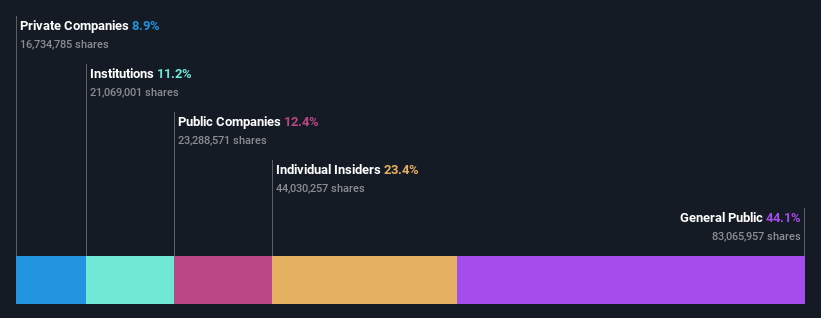Key Insights
-
The considerable ownership by individual investors in Vulcan Energy Resources indicates that they collectively have a greater say in management and business strategy
-
50% of the business is held by the top 12 shareholders
If you want to know who really controls Vulcan Energy Resources Limited (ASX:VUL), then you’ll have to look at the makeup of its share registry. The group holding the most number of shares in the company, around 44% to be precise, is individual investors. In other words, the group stands to gain the most (or lose the most) from their investment into the company.
While insiders who own 23% came under pressure after market cap dropped to AU$730m last week,individual investors took the most losses.
In the chart below, we zoom in on the different ownership groups of Vulcan Energy Resources.
See our latest analysis for Vulcan Energy Resources
What Does The Institutional Ownership Tell Us About Vulcan Energy Resources?
Many institutions measure their performance against an index that approximates the local market. So they usually pay more attention to companies that are included in major indices.
Vulcan Energy Resources already has institutions on the share registry. Indeed, they own a respectable stake in the company. This can indicate that the company has a certain degree of credibility in the investment community. However, it is best to be wary of relying on the supposed validation that comes with institutional investors. They too, get it wrong sometimes. When multiple institutions own a stock, there’s always a risk that they are in a ‘crowded trade’. When such a trade goes wrong, multiple parties may compete to sell stock fast. This risk is higher in a company without a history of growth. You can see Vulcan Energy Resources’ historic earnings and revenue below, but keep in mind there’s always more to the story.
Vulcan Energy Resources is not owned by hedge funds. From our data, we infer that the largest shareholder is Francis Edward Wedin (who also holds the title of Top Key Executive) with 8.3% of shares outstanding. Its usually considered a good sign when insiders own a significant number of shares in the company, and in this case, we’re glad to see a company insider play the role of a key stakeholder. For context, the second largest shareholder holds about 7.5% of the shares outstanding, followed by an ownership of 6.3% by the third-largest shareholder.
After doing some more digging, we found that the top 12 have the combined ownership of 50% in the company, suggesting that no single shareholder has significant control over the company.
Researching institutional ownership is a good way to gauge and filter a stock’s expected performance. The same can be achieved by studying analyst sentiments. Quite a few analysts cover the stock, so you could look into forecast growth quite easily.
Insider Ownership Of Vulcan Energy Resources
While the precise definition of an insider can be subjective, almost everyone considers board members to be insiders. The company management answer to the board and the latter should represent the interests of shareholders. Notably, sometimes top-level managers are on the board themselves.
I generally consider insider ownership to be a good thing. However, on some occasions it makes it more difficult for other shareholders to hold the board accountable for decisions.
It seems insiders own a significant proportion of Vulcan Energy Resources Limited. It has a market capitalization of just AU$730m, and insiders have AU$171m worth of shares in their own names. This may suggest that the founders still own a lot of shares. You can click here to see if they have been buying or selling.
General Public Ownership
With a 44% ownership, the general public, mostly comprising of individual investors, have some degree of sway over Vulcan Energy Resources. While this size of ownership may not be enough to sway a policy decision in their favour, they can still make a collective impact on company policies.
Private Company Ownership
We can see that Private Companies own 8.9%, of the shares on issue. It might be worth looking deeper into this. If related parties, such as insiders, have an interest in one of these private companies, that should be disclosed in the annual report. Private companies may also have a strategic interest in the company.
Public Company Ownership
Public companies currently own 12% of Vulcan Energy Resources stock. We can’t be certain but it is quite possible this is a strategic stake. The businesses may be similar, or work together.
Next Steps:
I find it very interesting to look at who exactly owns a company. But to truly gain insight, we need to consider other information, too. Case in point: We’ve spotted 2 warning signs for Vulcan Energy Resources you should be aware of.
Ultimately the future is most important. You can access this free report on analyst forecasts for the company.
NB: Figures in this article are calculated using data from the last twelve months, which refer to the 12-month period ending on the last date of the month the financial statement is dated. This may not be consistent with full year annual report figures.
Have feedback on this article? Concerned about the content? Get in touch with us directly. Alternatively, email editorial-team (at) simplywallst.com.
This article by Simply Wall St is general in nature. We provide commentary based on historical data and analyst forecasts only using an unbiased methodology and our articles are not intended to be financial advice. It does not constitute a recommendation to buy or sell any stock, and does not take account of your objectives, or your financial situation. We aim to bring you long-term focused analysis driven by fundamental data. Note that our analysis may not factor in the latest price-sensitive company announcements or qualitative material. Simply Wall St has no position in any stocks mentioned.









